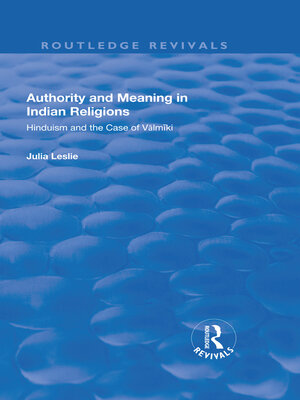Authority and Meaning in Indian Religions
ebook ∣ Hinduism and the Case of Valmiki · Routledge Revivals
By Julia Leslie

Sign up to save your library
With an OverDrive account, you can save your favorite libraries for at-a-glance information about availability. Find out more about OverDrive accounts.
Find this title in Libby, the library reading app by OverDrive.



Search for a digital library with this title
Title found at these libraries:
| Library Name | Distance |
|---|---|
| Loading... |
This title was first published in 2003. Can a text be used either to validate or to invalidate contemporary understandings? Texts may be deemed 'sacred', but sacred to whom? Do conflicting understandings matter? Is it appropriate to try to offer a resolution? For Hindus and non-Hindus, in India and beyond, Valmiki is the poet-saint who composed the epic Rà mà yaÃμa. Yet for a vocal community of dalits (once called 'untouchables'), within and outside India, Valmiki is God. How then does one explain the popular story that he started out as an ignorant and violent bandit, attacking and killing travellers for material gain? And what happens when these two accounts, Valmiki as God and Valmiki as villain, are held simultaneously by two different religious groups, both contemporary, and both vocal? This situation came to a head with controversial demonstrations by the Valmiki community in Britain in 2000, giving rise to some searching questions which Julia Leslie now seeks to address.







